Can ice cream vans stage a comeback?
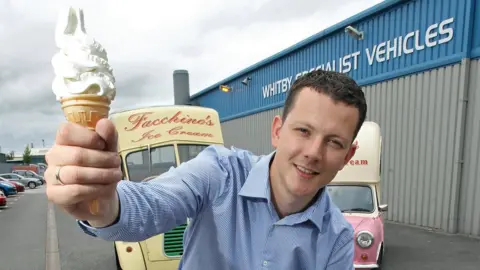 Ed Whitby
Ed WhitbyFor many of us, the distinctive chimes of an ice cream van conjure up happy childhood memories of British summers and dripping ice lollies.
But the number of ice cream vans has been falling for years, leading some to believe that those bells may mean nothing to future generations of children.
A crop of small, family-run businesses is determined to keep the industry alive however.
These ice cream entrepreneurs have found business models that enable them to thrive in a market dominated by large retailers. And some have even dipped their toes in the export market.
One such success story is Londoner John Bonar, 53, who started selling ice cream when he was just 11.
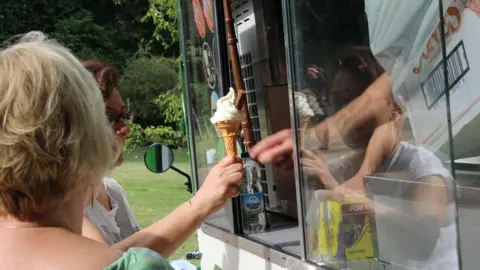 Max Ramsay
Max Ramsay"We would get on a lorry in the East End, fill barrows full of ice cream, get dropped off around Hyde Park or Madame Tussauds and just sell ice cream," he tells me.
He launched his own business at the age of 21, selling ice cream from a van with a hole in the floor and windscreen wipers that didn't work.
Changing consumer habits
Today his firm Piccadilly Whip operates 20 ice cream vans in London and Essex, and has fixed stands at Tower Bridge.
Despite these achievements, Mr Bonar says that conditions have got much tougher for ice cream vans since they first became popular in the UK in the 1950s.
"When I was a kid, there was four or five ice cream vans who would come round our streets and they would all earn a living.
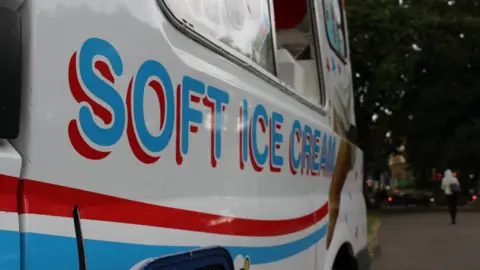 Max Ramsay
Max Ramsay"But there are less and less over the years, because people can buy ice cream cheaply in supermarkets and everybody has got a freezer in their house."
Britain's ice cream market is worth about £1bn each year, according to trade group the Ice Cream Alliance, but there is no concrete data on the number of ice cream vans in operation.
The Guardian, however, estimated that there were 2,500 vans on UK roads in 2013, when falling numbers led The Sunday People to launch a campaign to save the industry.
Changing tastes may have led to less work for vans on the streets, but there has been a rise in opportunities at festivals, weddings and corporate events.
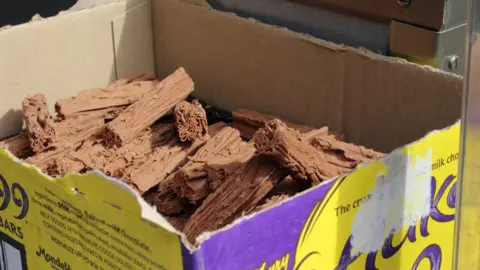 Max Ramsay
Max RamsayThis has become a key source of revenue for Piccadilly Whip, whose vans will sometimes be at seven events at the same time.
Piccadilly Whip's vans are made by Whitby Morrison, a Crewe-based firm employing 50 staff, fronted by operations director Ed Whitby.
Local roots
His grandfather Bryan started the business in 1962, taking on vehicle conversions that "everyone else said were impossible" and succeeding, Ed says with pride.
The firm became the "market leader" in the 1980s after its main competitor went bust, and today sells around 100 new vans each year, exporting about 20% of them.
 Laura Mott Photography
Laura Mott PhotographyIts vans sell ice cream in more than 60 countries, including Kazakhstan, Malawi and Guyana - although despite its global ambitions, Whitby Morrison still prides itself on its local roots.
"We look to take people on from school, put them through their apprenticeships, suffer all the girlfriend problems, the first mortgage, the first child," Mr Whitby says over the phone. "We're founded on real family values."

More stories from the BBC's Business Brain series looking at quirky or unusual business topics from around the world:

Mobile ice cream vans have not always had a good reputation, with some arguing that they promote obesity and create pollution.
Glasgow's "Ice Cream Wars" of the early 1980s, in which rival gangs sold drugs and stolen goods from ice cream vans, didn't help either.
Katy Alston, the founder of Pinks Vintage Ice Cream, adds that a high level of competition has made it a tough market for newcomers.
"When I started 15 years ago, there were a couple of other ice cream van operators who didn't seem to be particularly fond of someone new, someone who was female."
She struggled as a result and "had to become stronger", but says that operators like herself have become a modernising force in the industry.
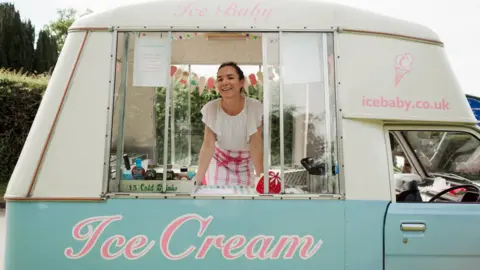 Claire Macintyre
Claire MacintyreMrs Alston launched her business after her husband gave her an ice cream van as a surprise present - although at first she was disappointed by the gift.
"People see the vans now and they think 'oh you were so lucky, they're lovely', but that first van was an absolute heap."
Pinks Vintage Ice Cream, based in Bognor Regis, has since grown to two vans and a vintage-style ice cream tricycle.
Mrs Alston's daughter Georgia has also dropped out of university to join the business, despite her mother's initial reservations.
"I had to do a whole business plan, it was 20 pages long. It was like Dragons' Den but to your mum," Georgia says.
Harnessing social media
For the last 11 years, Natasha Laws has been serving ice cream at events around Hertfordshire from her van Ice Baby, named after the rap song by Vanilla Ice.
However, her route into the industry owes something to luck.
She had been prepared to pay £1,000 for the van on eBay, but someone outbid her. However, with encouragement from a colleague she put on a £1,050 bid at the last moment and won the auction.
Like Mrs Alston, the 42-year-old faced some intimidation from old-school Mr Whippy men when she first started.
But she has gone on to build a thriving business, partly by using social media to publicise Ice Baby. She has some 26,000 followers on Instagram where she posts pictures of her ice creams.
These days nostalgia is an important trend in the industry, and Ice Baby and Pinks Vintage both see it as a crucial part of their brands.
But will nostalgia be enough to provide a secure future for mobile ice cream sellers on our streets?
Mrs Alston is optimistic: "I think there is a future for mobile ice cream vans. Direct contact with the community is really important."
Mr Bonar agrees. "It's a British institution and our vans are the best in the world. They'll always have a place."